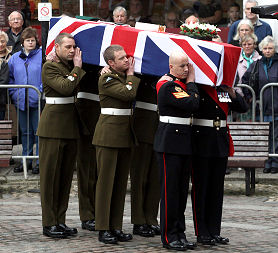Olaf Schmid was ‘unlawfully killed’
The inquest into the death of bomb disposal specialist Staff Sgt Olaf Schmid in Afghanistan has found he was unlawfully killed.
Nothing in the army operation which led to the death of Staff Sergeant Olaf Schmid could have prevented his “catastrophic injuries” in Afghanistan, Cornwall coroner Emma Carlyon recorded today.
Staff Sgt Schmid, from Truro in Cornwall, died disarming an improvised explosive device in Helmand. It exploded, killing him instantly.
His widow Christina accepted the George Cross on his behalf last year.
The 30-year-old soldier died the day before he was due to return to the UK after a five month tour.
Today the army’s head of explosive safety, Colonel Robert Seddon, is detailing his investigation into Olaf Schmid’s death.
He began by paying tribute to Olaf Schmid, calling him a “phenomenally brave and courageous” man.
He tackled claims from witnesses yesterday that Olaf Schmid was “rushing” his work.
Read more: Afghanistan - taking on the Taliban
Colonel Seddon said he believed Olaf Schmid was working quickly because he would have been concerned about losing daylight.
He pointed out that in winter in Afghanistan the light starts to fail and the shadows start to lengthen at five o’clock in the afternoon. He said “Olaf Schmid would have had a mental clock in his head”.

Yesterday the inquest heard from Sapper Craig Butterworth, who said Schmid seemed “rushed” – perhaps because the task was his “last stop” before he was due to come home on leave.
He said Staff Sgt Schmid had pulled an IED wire out of the ground by hand and had said, “You didn’t see me do this”.
Colonel Seddon said this was “not recommended drill” and he “would not condone it” but he could understand why Olaf Schmid had done it, because he would have known the IED could have been right under his feet and needed to know exactly where the trigger was.
He added that he believed Staff Sgt Schmid had been “cautious” in his approach to disarming the IED and “nothing he did was unsafe”.
"It would be naïve to think we will beat the Taliban militarily, but we can drive a wedge between them and those they seek to manipulate, the ordinary people."
Read Captain Doug Beattie's latest blog from the frontline - Afghanistan: nearly ten years, what progress in Helmand?